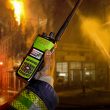Report gives failing grades for homeland security
Public-safety entities should be given access to valuable 700 MHz spectrum in 2007 instead of the 2009 dates proposed in pending legislation, according to the 9/11 Public Discourse Project report released today.
Issued in response to the 9/11 Commission’s report, the report acknowledges some progress in pursuit of homeland security, “but we are not as safe as we need to be,” Public Discourse Project Chairman Thomas Kean and Vice Chairman Lee Hamilton said in a joint statement.
“We see some positive changes. But there is so much more to be done,” the statement reads. “There are far too many C’s, D’s, and F’s in the report card we will issue today. Many obvious steps that the American people assume have been completed have not been. Our leadership is distracted.”
One of the failing grades in the report regarded radio spectrum for first responders, although it was issued with a caveat that the grade would be a “C” if budget legislation that passed the House and the Senate is enacted that sets a firm date for giving 24 MHz of spectrum in the 700 MHz band to public safety.
However, both the House and Senate bills call for these airwaves to be transferred in 2009, which is “too distant, given the urgency of the threat,” the report states. “A 2007 handover date would make the American people safer sooner.”
Lawmakers have considered an earlier transition date for the spectrum now occupied by television broadcasters, but public-safety officials have indicated that equipment-manufacturing cycles dictate that early release of the airwaves would have limited value for them.
In addition, Kean and Hamilton said it is “scandalous” that firefighters and police officers cannot communicate reliably in many major cities.
Both the House and Senate bills would earmark proceeds from the auction of 700 MHz spectrum—$500 million in the House version, $1 billion in the Senate proposal—to fund grants for interoperable communications.
“We’ve basically passed legislation that does what the report asks … and the Senate has, too,” an aide for the House Commerce Committee said. “We’re just waiting to get everyone together in conference and work out the details.”
Yucel Ors, legislative director for the Association of Public-safety Communications Officials (APCO), said the House and Senate have not named their respective members to the conference committee that will determine the future of the 700 MHz band. Conferees are expected to be named during the next week and action on the legislation is expected to be taken “pretty fast” after the Senate returns on Dec. 12, Ors said.
The full report can be found at www.9-11pdp.org.

















